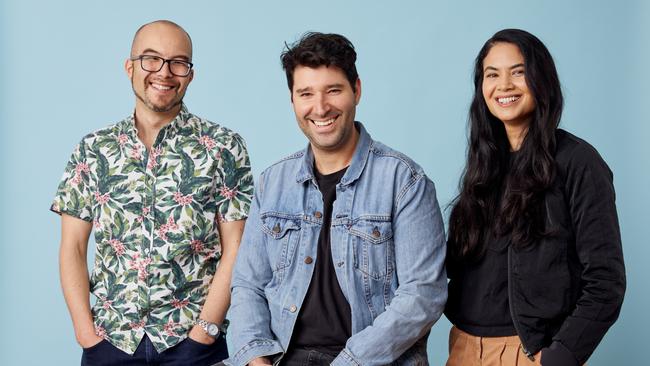‘We’re recession-proof’: Canva founders defiant amid downturn
The start-up that had its valuation slashed by 40pc has hit back saying not a day goes by without new business landing at its feet.

Australian start-up darling Canva is continuing to grow and hire despite its valuation being slashed by investors by as much as 40 per cent, as co-founders Melanie Perkins, Cliff Obrecht and Cameron Adams move to add headcount and potentially make new acquisitions amid what has otherwise become a bloodbath for the local technology industry.
Launching a new suite of workplace products this week at a flashy event at Sydney’s Hordern Pavilion, Canva’s co-founders – who recently dropped out of the global billionaire rankings – say they want to make the most of the current market volatility, including hiring staff from other start-ups or buying up their companies.
“We’re a profitable company, we have $US700m ($1.04bn) in the bank. There’s not a day that goes by without multiple companies for sale landing in my inbox, so while there’s a lot of pressure on other folks, it provides some level of opportunity for us,” Canva co-founder Cliff Obrecht said.

“Our team is growing, we’re continuing to hire, we haven’t had any type of hiring pause.
“We’re really leaning in to this. One of the biggest regrets (Salesforce chief executive) Marc Benioff had was not leaning really early into the 2009 downturn, and there are a bunch of different examples like that where companies who have chosen to lean into the downturns have come out the other side much stronger, and we’re in a fortunate position to be able to do that.
“Our underlying business foundations are hugely profitable.”
Melanie Perkins, Canva’s chief executive, said while other start-ups have laid off staff, Canva has had more than 200,000 applications to join the company in the past 12 months. The software outfit now has over 3000 staff – growing its headcount by 50 per cent in the past year – and more than 85 million people now use its online design platform globally, across both its free and paid tiers.
“We have a lot of people wanting to join Canva which is extraordinarily helpful because we need incredible people to build this platform,” she said.
Once worth more than Telstra and Qantas, Canva has had its valuation slashed by multiple investors with US-based T Rowe Price cutting its valuation by 44 per cent since the end of 2021, downgrading its worth to $32.1bn – down $22.4bn – while Australian venture capital funds Blackbird, AirTree and Square Peg Capital each recently slashed its valuation by 36 per cent. Canva’s co-founders Cliff Obrecht and Melanie Perkins fell out of Bloomberg’s Top 500 billionaire list as a result.
One investor who hasn’t trimmed Canva’s valuation is former top Google executive Wesley Chan, one of the company’s earliest backers and a long-time board member.
“I don’t care. The thing I care about is what Canva is worth in ten years,” Mr Chan said in an interview. “This is a recession-proof business.
“Canva is one of those generational companies, and it’s compounding. If you told me back then that Canva would be raising money at a $US40bn valuation, I would have just laughed.

“I think the market has reset, there’s sticker shock in the market, but valuations are not things you can control. What you can control is whether you have a durable business, whether you’re profitable, and whether you have a long trajectory of cash. This reset will be good for them; the market used to prioritise growth at all costs. Canva is not raising more money so I don’t care what they’re worth right now.”
AirTree Ventures wrote down its investment in Canva by 36 per cent in August, but AirTree partner Craig Blair described the company as a “once in a lifetime business”.
“They have the world’s best metrics across growth, customer engagement, the loyalty of their community and the fundamentals of their business,” he said. “They are profitable, and they absolutely in control of their own destiny and can double down and strengthen what they’re doing.”
The company on Wednesday used its ‘Canva Create’ conference at Sydney’s Hordern Pavilion to unveil a suite of workplace products, including a Google Docs competitor – Canva Docs – along with new features for websites, team collaboration, and data visualisation. Canva started life as an online Photoshop rival but now will offer a much broader set of productivity and communication tools.
Chief product officer Cameron Adams said the new products were in response to demand from large teams who wanted to use Canva products in the workplace.
“I think for us, moving from consumer and small business to now large teams collaborating on our platform has been the biggest shift over the past couple of years, and the pandemic really crystallised that,” he said.
“Visual communication is going to become a huge competitive advantage for companies who get on board with it, they’ll be more effective in their collaboration and send more focused messages. But we definitely don’t want to be a serious enterprise product, we always try to bring fun to whatever it is you’re doing, and we don’t think that fun and personality is something that you can only offer with tools people use at home.”

He added that Canva would be opening its doors to employees from other start-ups who have been forced into lay-offs.
“It’s been sad to see some of the companies that have laid off some of their staff or folded completely, but in that challenge there are always opportunities for companies who are growing like us. We know there is a huge amount of talent out there who have a great start-up mindset and who are keen for a company that truly want to work for.”
Canva will launch an IPO ‘eventually’ but has no current plans, he said.
Ms Perkins said despite its new focus on enterprise tools and having been around more than a decade, Canva is “definitely still a start-up”.
“The definition of a start-up I think is when your dreams are bigger than the size of your company,” she said. “And our dreams are way bigger than the size of our company.”



To join the conversation, please log in. Don't have an account? Register
Join the conversation, you are commenting as Logout